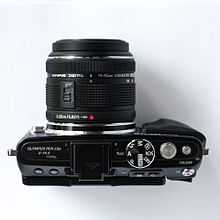Olympus PEN E-PL5
 | |
| Type | Micro Four Thirds, interchangeable lens camera |
|---|---|
| Sensor | Four Thirds System 18.00 × 13.50 mm Live MOS |
| Maximum resolution | 4608 x 3456 (16.1 megapixels) |
| Lens | Micro Four Thirds System mount |
| Flash | Clip-on (included), TTL, GN 10m equivalent (ISO200 · m); hotshoe for external flash attachment |
| Shutter | 1/4,000 to 60 s, up to 30 minutes bulb |
| Exposure metering | Digital ESP metering, Centre weighted average metering, Spot metering |
| Exposure modes | Program, shutter-priority, aperture-priority, manual |
| Metering modes | TTL ESP multi patterned (324-area multi pattern metering), Center-weighted average, Spot (1%) |
| Focus areas | 35 area contrast detect auto-focus, selectable |
| Focus modes | Single, continuous, manual |
| Continuous shooting | 8.0 frames/s (in case of "I.S. OFF") |
| Viewfinder | live preview, optional electronic viewfinder VF-2; optional electronic viewfinder VF-3; optional optical viewfinder VF-1 |
| ASA/ISO range | ISO 200–25600 |
| Rear LCD monitor | 3" 460,000 pixel TFT LCD on screen with live preview with capacitive touchscreen control |
| Storage | Secure Digital card; SDHC; SDXC |
| Battery | Olympus BLS-5 Lithium-ion battery |
| Dimensions | 110.5 × 63.7 × 38.2 mm (4.35" × 2.51" × 1.50") |
| Weight | 279 g (9.8 oz) (body only) 325 g (11.5 oz) (body, battery and SD memory card) |
The Olympus PEN E-PL5, announced on September 17, 2012[1] is Olympus Corporation's tenth camera that adheres to the Micro Four Thirds (MFT) system design standard. The E-PL5 succeeds the Olympus PEN E-PL3, and was announced in concert with one other model, the Olympus PEN E-PM2 (a simpler version of the PEN E-PL5 and the successor to the E-PM1).
Technology
The E-PL5, together with the E-PM2, features a touchscreen, similar to the Olympus PEN E-P3 and Olympus OM-D E-M5, and the same 16.1 megapixel sensor as is in the OM-D E-M5, with its increased ISO range, low-light capability and wide dynamic range. Although the Olympus E-PL5 uses the same sensor as the OM-D E-M5, it lacks the 5 axis stabilisation system of the latter, utilising a simpler system that only compensates for yaw and pitch.
The E-PL5 increases autofocus speed through use of a 240 Hz refresh rate for its sensor, similar to the technology used in its flagship MFT camera, the OM-D E-M5. The benefits of the 240 Hz refresh rate also provides the ability for continuous autofocus tracking during bursts of exposures, a faster shutter response (less lag) and less blackout time between exposures.
The E-PL5 has a capacitive touchscreen similar to E-P3 and OM-D E-M5 for creative camera control, but lacks an OLED type display that is supposed to vastly improve performance in sunny conditions, and off-angle viewing. Instead, the E-PL5 has a tiltable LCD, which allows easy above the head, waist level, low off the ground viewing and self-portraits. The E-PL5 continues with the proprietary Accessory Port, a power and communication port, which allows the use of various accessories, such as an external stereo microphone for HD video recording, LED macro lights, and a bluetooth communications adapter. The accessory port continues to be compatible with the optional hotshoe mounted VF-2 and VF-3 electronic viewfinders (EVF).
Differences over Olympus PEN E-PL3
- 16.1 megapixel sensor instead of 12.3 megapixel
- Option to reduce the size of the focus points
- For the first time, Olympus gives priority over its own in-body system to lens-based image stabilisation when Panasonic lenses with this feature are mounted
- 170 degree "flip-up" capacitative touchscreen
- Detachable grip
- New "Water Colour" Art Filter in addition to the 11 existing Art Filters of the E-PL3.
Specifications not in the infobox
- 1080 Full HD video at 30p frames per second [2]
See also
References
- ↑ Dpreview.com: Olympus refreshes PENS with E-PL5 and E-PM2 touch-screen 16MP mirrorless models
- ↑ Olympus Imaging India Private Limited. "E-PL5 Specs". olympus-imaging.co.in. Retrieved 2012-10-31.
External links
![]() Media related to Olympus E-PL5 at Wikimedia Commons
Media related to Olympus E-PL5 at Wikimedia Commons
- Olympus PEN E-PL5 Product Site
- Dpreview.com: Olympus PEN E-PL3 and PEN E-PM1 Preview
- Photographyblog.com: Olympus PEN E-PL5 Review
- Ming Thein: The Olympus E-PL5 PEN Lite review: a mini-OM-D
| Preceded by Olympus PEN E-PL3 |
Olympus PEN E-PL5 Micro Four Thirds System Camera Autumn 2012–present |
Succeeded by Olympus PEN E-PL6 |
| |||||||||||||||||||||||||||||||||||||||||||||||||||||||||||||||||||||||||||||||||
| Micro Four Thirds cameras timeline | |||||||||||||||||||||||||||||||||||||||||||||||||||||||||||||||||||||||||||||||||||||||||||||||||||||||||||||||||||||||||||||||||||||||||||||||||||||||||||||||||||||||||||||||||||||||||||||||||||||||||||||||||||||||||||||||||||||||||||||||||||||||||||||||||||||||||||||||||||||||
|---|---|---|---|---|---|---|---|---|---|---|---|---|---|---|---|---|---|---|---|---|---|---|---|---|---|---|---|---|---|---|---|---|---|---|---|---|---|---|---|---|---|---|---|---|---|---|---|---|---|---|---|---|---|---|---|---|---|---|---|---|---|---|---|---|---|---|---|---|---|---|---|---|---|---|---|---|---|---|---|---|---|---|---|---|---|---|---|---|---|---|---|---|---|---|---|---|---|---|---|---|---|---|---|---|---|---|---|---|---|---|---|---|---|---|---|---|---|---|---|---|---|---|---|---|---|---|---|---|---|---|---|---|---|---|---|---|---|---|---|---|---|---|---|---|---|---|---|---|---|---|---|---|---|---|---|---|---|---|---|---|---|---|---|---|---|---|---|---|---|---|---|---|---|---|---|---|---|---|---|---|---|---|---|---|---|---|---|---|---|---|---|---|---|---|---|---|---|---|---|---|---|---|---|---|---|---|---|---|---|---|---|---|---|---|---|---|---|---|---|---|---|---|---|---|---|---|---|---|---|---|---|---|---|---|---|---|---|---|---|---|---|---|---|---|---|---|---|---|---|---|---|---|---|---|---|---|---|---|---|---|---|---|---|---|---|---|---|---|---|---|---|---|---|---|---|---|---|---|---|
| |||||||||||||||||||||||||||||||||||||||||||||||||||||||||||||||||||||||||||||||||||||||||||||||||||||||||||||||||||||||||||||||||||||||||||||||||||||||||||||||||||||||||||||||||||||||||||||||||||||||||||||||||||||||||||||||||||||||||||||||||||||||||||||||||||||||||||||||||||||||